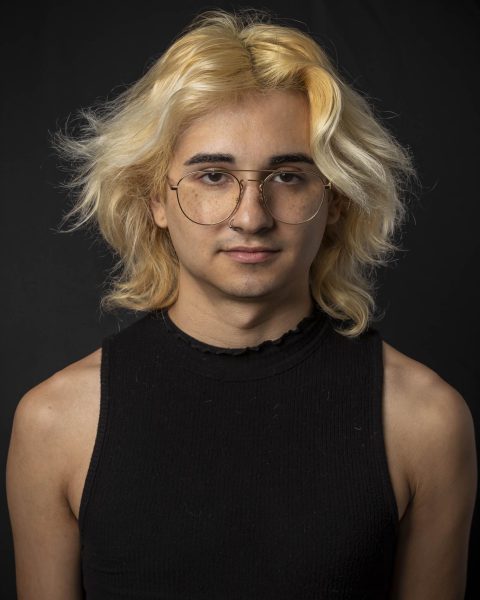
For the 320 students graduating in December, this is not the finish they had imagined.
The part-time faculty union has been on strike since Oct. 30, which means some students have lost more than half of their semester, even as many classes have started again with replacement teachers.
Senior fashion merchandising major Keeley Ivanyi had four out of her five instructors go on strike. She described the strike as “a sense of absence that I did not expect to have this far into the semester nearing the end.”
“It just absolutely broke in my heart to not be able to learn as much as I had thought initially,” Ivanyi said. “It just so happens that in my last semester here at Columbia, I am taking a bunch of classes that I feel are very dire and important for my career path outside of school.”
Senior marketing major Zachary Huff said that the strike has made him feel “very disappointed” in his last weeks at Columbia.
“I basically missed the most important weeks, missing out on all the resources that college provides for us,” Huff said. “I’m missing out on the community and camaraderie that comes along with being in college.”
Of his six courses, two were taught by instructors who were not on strike and four were taught by part-time instructors, Huff said.
The college reassigned the courses of striking part-time teachers after Thanksgiving break and asked students to return. Many of the college’s 221 full-time faculty members picked up their courses to finish the semester.
The Columbia Faculty Union represented 584 part-time instructors at the start of the semester, and 237 part-time faculty are currently teaching, a number that includes those who never participated in the strike and others who came back, said Lambrini Lukidis, associate vice president of Strategic Communications & External Relations.
Huff said his replacement instructors have helped him feel more engaged.
“In terms of the end of this semester, I’m feeling pretty prepared simply because the new teachers that have come in have worked with the schedule that we have so we’re not overwhelmed.” Huff said.
The uncertainty of the strike — and not knowing when or if classes would resume — made things hard for some students. Others have reported that classes are meeting at different times or in different formats now.
Ivanyi works at a retail store in the suburbs and said that her work schedule has been “up in the air” every week since the strike began. “I’m losing out on potential money that I could be making instead of not coming to class or not being able to Zoom in on a class.”
Senior cinema and television major Ben Kammer said he received an email from his replacement instructor for “Assistant Editing” stating that the class was moved from 12:30 p.m. to 3:30 p.m. when he had another class in session. The instructor offered to meet outside of class time.
“I’ve kind of built my work schedule around my class schedule expecting that my class schedule will never change,” Kammer said. “I don’t really have a lot of time outside of what I’ve allocated to class time and work, so it’s nice that they’ve tried to reach out and help the best they can, but it’s not the same.”
Kammer said that since attending “Assistant Editing” on Zoom, he feels like his money is “not being well spent.”
“It’s a disservice to students that they can charge full price for a course to end like this where I feel like I am not getting anything,” Kammer said. “I don’t have any help from my parents, I’m paying through my college myself. It’s so frustrating to me that I’m spending thousands of dollars and getting this subpar education.”
Some seniors are also frustrated with the hands-on experience that has been taken away from them.
At the start of the semester, Ivanyi was particularly anticipating the projects planned in her “Fashion Styling: Studio” course, which was a course taught by a part-time faculty member.
“It’s upsetting that I haven’t been able to learn those things to then put into my portfolio or use as experience in my resume to share because a lot of the classes like I said that I’m taking now are very vital to what I want to do as a full-time career.” Ivanyi said.
Ivanyi said that she reviewed the syllabus for this class and is missing out on being in a studio, which is “what the whole class is about.”
“Our professor said we were going to learn how to do an actual styling shoot and work with models. We could have been in the studio doing so much work to really captivate and show our skills on our portfolios, but we missed out on all of that.” Ivanyi said.
President and CEO Kwang-Wu Kim has said that the college is considering tuition credit, though no decision has been made.
The college has offered pass/fail options for all classes for the fall semester and since the strike began tried to assure students that they would be able to graduate.
For many seniors, though, just getting to the end is not enough.
“It’s so frustrating that it’s ending like this. My priority shouldn’t be that I just need to pass, my priority should be learning,” Kammer said.
But at this point, with so much of the semester lost, even with classes resuming, Huff wants the college and union to take their time to resolve their issues.
“It doesn’t look like our teachers are coming back,” Huff said. “I’d rather the union and the school take as much time to come to an agreement that works for the both of them instead of trying to compromise when they don’t really like the deal and they can get something done since they kind of took the whole semester away anyway.”









